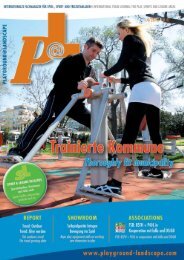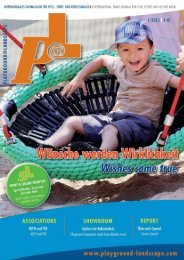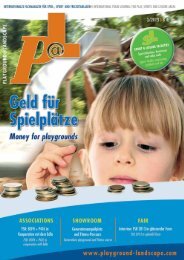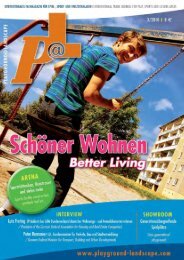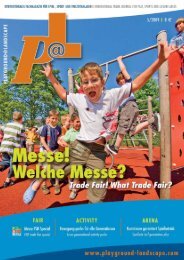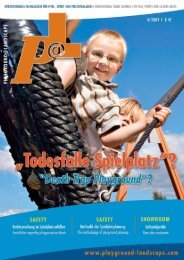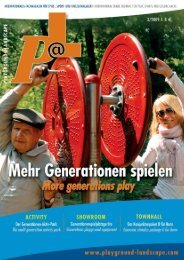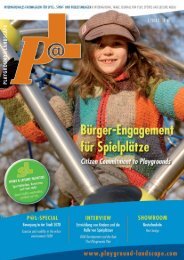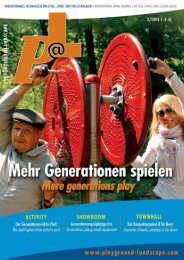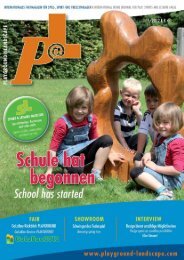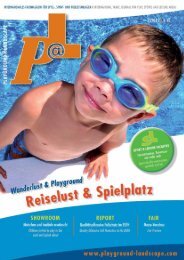Download - Playground@Landscape
Download - Playground@Landscape
Download - Playground@Landscape
Sie wollen auch ein ePaper? Erhöhen Sie die Reichweite Ihrer Titel.
YUMPU macht aus Druck-PDFs automatisch weboptimierte ePaper, die Google liebt.
ACTIVITY<br />
Abbildung 3: Priorisiertes Bewegungsverständnis<br />
der frühpädagogischen<br />
Fachkräfte (N= 1737)<br />
fünfstufigen Skalierung (1 = sehr gering; 5 = sehr hoch) sollte<br />
angegeben werden, welche bewegungsrelevanten Ausbildungsinhalte<br />
in der eigenen Ausbildung Berücksichtigung fanden.<br />
Die im Fragebogen aufgeführten Inhaltsbereiche wurden<br />
für die Datenauswertung in die drei Schwerpunkte „aktuelle<br />
Themen“, „Praxis“ und „Theorie“ unterteilt.<br />
Als Ergebnis kann eine sehr differenzierte Berücksichtigung<br />
spezifischer Ausbildungsinhalte festgehalten werden: die<br />
„praktische Umsetzung von Bewegungsspielen/-angeboten“<br />
nimmt den höchsten Stellenwert ein. Andere praktische Ausbildungsinhalte<br />
wurden hingegen eher gering berücksichtigt.<br />
Theoretische Ausbildungsaspekte finden durchschnittlich eine<br />
mittlere Berücksichtigung. Die in der Fachdiskussion aktuellen<br />
Themen „Bewegung bei Kindern im Alter unter 3 Jahren“, „Inklusion“<br />
, „Transition“ sowie „Innen- und Außenraumgestaltung"<br />
wurden in der Ausbildung der Fachkräfte jedoch eher gering<br />
aufgegriffen. Eine mögliche Begründung ist hier, dass die<br />
Ausbildung der befragten Fachkräfte<br />
i.d.R. bereits länger zurück liegt (Durchschnittsalter<br />
45 Jahre) und diese Themen<br />
noch nicht im Lehrplan berücksichtigt<br />
wurden. Bei der Gegenüberstellung<br />
der eigenen Ausbildungsinhalte<br />
und der bewegungsbezogenen Fortbildungswünsche<br />
zeigt sich deutlich, dass<br />
die Fachkräfte insbesondere in ihren<br />
Defizitbereichen einen besonderen<br />
Fort- und Weiterbildungsbedarf einräumen<br />
(vgl. Stahl-von Zabern u.a., 2013<br />
i.Dr.). Von besonderem Interesse für die Leser dieser Zeitschrift<br />
dürfte der Befund sein, dass das Thema der Innen- und Außenraumgestaltung<br />
an erster Stelle der Fortbildungswünsche<br />
rangiert.<br />
Erste Konsequenzen und Schlussfolgerungen<br />
Die Ergebnisse zeigen, dass frühpädagogische Fachkräfte die<br />
Bewegung bei Kindern im Alter von 0 – 6 Jahren vorwiegend<br />
als „Medium der Entwicklungsförderung“ verstehen. Dennoch<br />
werden auch andere Bedeutungsdimensionen zum Thema<br />
Bewegung benannt, so dass hauptsächlich von einem komplexen<br />
Bewegungsverständnis der Fachkräfte ausgegangen<br />
werden kann. Die Bedeutung und der Stellenwert von<br />
Bewegung für die gesamte Entwicklung des Kindes werden<br />
insgesamt von den Untersuchungsteilnehmerinnen als hoch<br />
eingeschätzt. Jedoch zeigen die Befragungsergebnisse<br />
very rarely selected (cf. Stahl-von Zabern et al., 2013, article in press).<br />
Exercise-related training priorities and<br />
the need for continuing education<br />
The results of the survey show that most early childhood educators have<br />
a positive view (important to very important) of the relevance of exercise<br />
to overall development and its beneficial effects on the health and<br />
education of children aged 0 – 6 years. However, in order to incorporate<br />
exercise as a feature in the day-to-day running of preschool facilities,<br />
certain structural requirements need to be met (availability of keys for<br />
the personnel, space and materials etc.) while personnel require the<br />
necessary expertise. The question arises of whether educators are being<br />
provided with adequate training in this subject. They were thus also<br />
asked to specify, on a five-point scale (1 = very little, 5 = a great deal), in<br />
what exercise-relevant aspects they had received tuition during their own<br />
training. The items listed in the questionnaire were categorised in<br />
the three main areas “current topics”, “practice” and “theory” for the<br />
purpose of data analysis. The outcome demonstrates that there is a<br />
highly differentiated approach to the various facets of training: “practical<br />
implementation of exercise-related games and activities” was accorded<br />
the most importance, while other practical training aspects<br />
tended to receive less attention. In general, theoretical considerations<br />
were taken into account to some extent in training programmes. Topics<br />
and concepts that are being afforded considerable significance in the current<br />
academic debate, such as “Exercise for children under the age of 3<br />
years”, “Inclusion”, “Transition” and “Internal and external spatial design”<br />
tended to be dealt with only cursorily during the training received<br />
by the educators. This could be attributable to the fact that most of the<br />
educators had undergone their training a considerable time ago (their<br />
average age was 45 years), meaning that these topics were not yet<br />
included in the curriculum. When it came to comparison of the exerciserelated<br />
training they had actually received with that they would like to<br />
receive, it was apparent that the educators expressed a clear desire for<br />
further education in the areas in which they felt there was a shortfall (cf.<br />
Stahl-von Zabern et al., 2013, article in press.). Of particular interest to<br />
the readers of this journal will be the finding that the educators put the<br />
topic of internal and external spatial design in first place when it came<br />
to the subjects in which they felt they required further education.<br />
Preliminary implications and conclusions<br />
The results of the survey show that early childhood educators consider<br />
exercise to be primarily a “means of promoting development” in children<br />
aged 0 – 6 years. However, they also cite other factors relevant to the<br />
topic of exercise, so that it can be assumed that they have a rather<br />
69



